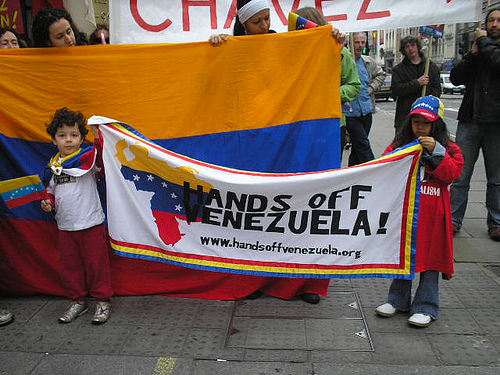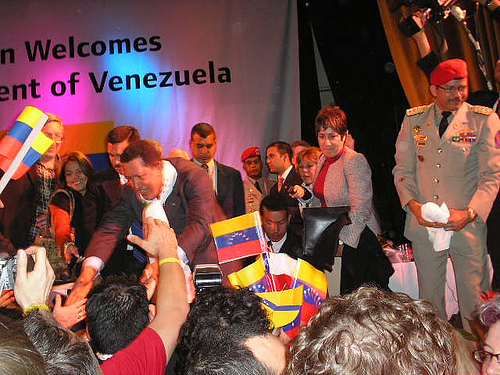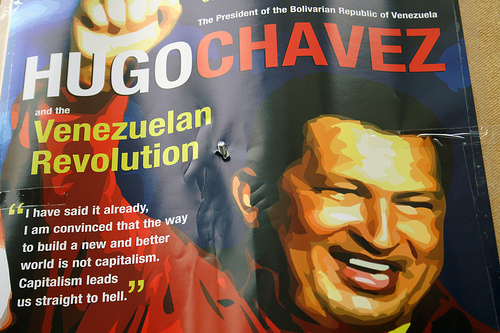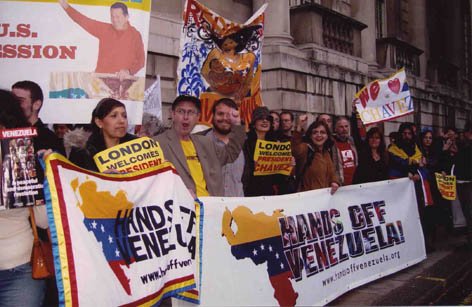Hugo Chavez in Historic Visit to London
- 18 May 2006
The visit of President Hugo Chavez to London was one of enormous enthusiasm. Thousands of supporters turned out to see the President over his two-day visit, which was hosted by Ken Livingstone, the Mayor of London.
Five
welcoming rallies were organised by Hands Off Venezuela in different
locations over the two days with the full support of the Bolivarian
Circles and the Venezuela Solidarity Campaign. These began with a
lively rally outside the President's hotel in Central London.
People brought flags, banners and placards, dressed in red T-shirts
and painted faces. Singing and chanting took place for three hours
before the President finally arrived and "Uh! Ah! Chavez no se va!"
continually echoed in the entrance of the Savoy Hotel.
 On
behalf of the Hands Off Venezuela Campaign, Rob Sewell of the HOV
steering committee welcomed everybody, explaining that this visit by
Hugo Chavez was an historic occasion that served to highlight the
Venezuelan Revolution. "Two nights ago, Hands Off Venezuela in
Austria organised a 5,000-stong meeting to greet the President. We
must continue the welcome in Britain, which must be used to build
support for the Revolution."
On
behalf of the Hands Off Venezuela Campaign, Rob Sewell of the HOV
steering committee welcomed everybody, explaining that this visit by
Hugo Chavez was an historic occasion that served to highlight the
Venezuelan Revolution. "Two nights ago, Hands Off Venezuela in
Austria organised a 5,000-stong meeting to greet the President. We
must continue the welcome in Britain, which must be used to build
support for the Revolution."
By the time the President
arrived, the crowd had swollen to some 200 people, many with their
own banners and placards. As the President stepped out of his car,
the crowd surged forward and he was greeted with a storm of support.
It was like a rugby scrum. Throwing aside all protocol, the President
mixed with the crowd, shaking hands and greeting as many people as he
possibly could, in particular the representatives of Hands Off
Venezuela
Espe Espigares, a
member of the HOV Steering Committee, greeted President Chavez on
behalf of the Hands Off Venezuela Campaign and extended a very warm
welcome on behalf of everybody present. After this brief conversation
he thanked the HOV campaign for the tremendous work we were doing to
support the Venezuelan Revolution. President Chavez said: "I thank
you for the work you are doing and I would encourage you to continue
because this is very important for us and the Revolution".
Given
the delay in the President's arrival, the scheduled visit to
Miranda House was cancelled and the crowd made its way to the Camden
Centre. Hundreds of people were queuing right round the building, as
hundreds mingled outside, shouting slogans and waving banners.
It
is a shame that the organisers had not listened to the solidarity
organisations who were pressing for a much larger venue. When HOV
first heard of the visit, we immediately contacted the Venezuelan
Ambassador in London and then tried to secure the Royal Albert Hall
for a mass rally for Chavez. Unfortunately, despite our
representations, our efforts were turned down. We were later informed
that the organisation of the visit had been put exclusively in the
hands of Ken Livingstone's Greater London Authority. HOV had
prepared posters and leaflets for the meeting, but were informed that
no publicity was allowed. And although we had insisted on an open
meeting, the mayor's office unilaterally decided that it was to be
by invitation only.
The capacity of the Camden Centre was 800, but more than 5,000 people had applied to attend via the Great London Authority website. It seems strange that the Mayor of London could not find a bigger venue than this. In the event, hundreds of people were turned away. Hands Off Venezuela was allocated only 100 tickets for the event, which were snapped up within one hour. Hundreds more applied for tickets through HOV but, given the scandalous shortage of tickets, we were unable to provide them.
The hall itself was
packed with an enthusiastic, placard-carrying, banner-waving
audience. HOV had been told that no banners were allowed in the
meeting, but this was clearly not the case, so our large banner was
hastily brought in and draped over the balcony facing the platform.
Ken Livingstone, who chaired the proceedings, called on two
speakers to introduce the meeting. The first was Keith Sonnet,
assistant general secretary of Unison, representing the Venezuela
Information Centre, who wanted those who threatened Venezuela to know
that they faced huge opposition. The second was Jeremy Dear, general
secretary of the National Union of Journalists, representing the
Hands Off Venezuela Campaign.
Jeremy stated that
President Chavez's visit was having an electrifying effect. He
praised Ken Livingstone's efforts as the host, but felt that a far
larger venue would have been more appropriate given the thousands of
people keen to hear Chavez. "There are thousands of people out
there desperate to hear President Chavez", he said. He called on
the President to return to London in the future where a far larger
reception will be organised.
When President Chavez was
introduced, there was an enthusiastic response from the crowd. Chavez
thanked the people of Britain for their hospitality and launched into
a three hour speech, outlining the background and successes of the
Bolivarian Revolution. In the first words of his speech, Chavez
mentioned the gathering in Vienna, attended by 5,000 young people. He
explicitly thanked Alan Woods and Hands Off Venezuela for organising
this marvellous meeting.
 Hugo Chavez went on
to deal with the Bolivarian Revolution and contributions of Simon
Bolivar and Francisco de Miranda, who had visited and lived in
London. He explained how the great Industrial Revolution in Britain
and the great French Revolution had attracted the greatest thinkers
of the age. Bolivar's struggle was inspired by these events in
Europe. Chavez also praised the scientific socialism of Marx and
Engels, although these must not be treated as a dogma. He went on to
attack capitalism and imperialism for the destruction they were
bringing to the planet. He referred to Rosa Luxemburg and her great
contribution and repeated the phrase: "Socialism or
Barbarism".
Hugo Chavez went on
to deal with the Bolivarian Revolution and contributions of Simon
Bolivar and Francisco de Miranda, who had visited and lived in
London. He explained how the great Industrial Revolution in Britain
and the great French Revolution had attracted the greatest thinkers
of the age. Bolivar's struggle was inspired by these events in
Europe. Chavez also praised the scientific socialism of Marx and
Engels, although these must not be treated as a dogma. He went on to
attack capitalism and imperialism for the destruction they were
bringing to the planet. He referred to Rosa Luxemburg and her great
contribution and repeated the phrase: "Socialism or
Barbarism".
Chavez emphasised his commitment to socialism.
"I am a socialist. We are all socialists", he declared.
Socialism, he said, was the only way to save the world, the future of
which was threatened by capitalism. He went on to say that the idea
that History had ended was completely false. Referring to the power
of great ideas, Chavez explained that Karl Marx, Engels, Lenin and
Che Guevara were not dead. They are alive today in their ideas.
Hugo Chavez made an unexpected offer to supply cheap fuel from two
PDVSA refineries in Britain to poor neighbourhoods in London, which
the Mayor accepted. This is similar to the schemes already
implemented in the United States. As the meeting came to an end,
Chavez came to the front of the platform to shake the hands of
supporters. Despite all the problems it had been a most enthusiastic
meeting.
Chavez at the TUC
The next day, Hands Off Venezuela had called a
reception rally outside the headquarters of the Trades Union Congress
in Central London. Hands Off Venezuela magazines and leaflets were
distributed as members entered the building. As the meeting was about
to start, representatives of the Chavez delegation invited supporters
of Hands Off Venezuela to come into to the TUC meeting, together with
those of the Venezuela Solidarity Campaign. As we entered the
building, TUC stewards tried to prevent us, but were over-ruled by
Venezuelan security. About 100 people gathered at the TUC, members of
the General Council and other trade union general secretaries. Hands
Off Venezuela sat as a block in the meeting.
The chairperson
of the TUC, Gloria Mills, introduced the meeting by explaining that
"the TUC General Council has met in this building for 50 years. I
must say, for me this is the most interesting meeting this year."
At this point, Hugo Chavez corrected her: "for 50 years!" which
was met with laughter.The next speaker was Brendan Barber, general
secretary of the TUC, who welcomed President Chavez for coming to
address the TUC. Barber called for "a new kind of globalisation,
with social justice and workers' rights." He then called on
Chavez to speak.
But Chavez did not speak about globalisation.
Instead, he proceeded to give the General Council a history lesson,
starting with the French Revolution. He pointed out that the great
Venezuelan revolutionary Miranda had lived as a political exile in
London. He had been impressed by Britain's industrial revolution
and the new ideas associated with it. Even then, he said, the seed of
ideas which went beyond the framework of capitalism were present.
This was the starting point for Bolivar.
This was essentially
pre-socialist thought, stated Chavez. Maybe the members of the
General Council had never heard of Miranda, but they had certainly
heard of the next political exile mentioned by Chavez: "Karl Marx
lived and was buried here. He was one of the greatest ideologists of
scientific socialism. Bolivar was only aware of utopian socialism.
But some people want to bury socialism. But this is not the case.
Representatives of capitalism and neo-liberalism talked of the
failure of socialism. But their theory has failed", Chavez
continued.
Chavez then went on to talk about pre-Columbian
society in Latin America and how before the Conquest, people lived
under a socialistic system of society where there was no private
property. He returned again to the theme of socialism, particularly
scientific socialism (that is, Marxism). While pointing to the
defects of the Soviet Union, he said it was important to bring
together the experiences of the past. We needed new strengths, new
alternatives, to bring about socialism.
"The workers of the
world including Britain have a key role to play in this", he said.
"We want 21st century socialism." There is a threat to the world
from ecological disaster. We have the war in Iraq and the threats
against Iran. "We cannot guarantee jobs, houses, or lives under
capitalism. This is absolutely impossible under capitalism. Just look
at the problems of youth unemployment in Europe, the crisis in
pensions, and so on. We are anti-imperialists. But we are not against
the ordinary people of the United States. They are our friends," he
said.

In a reply to a question, Chavez stated that his
government was "a workers' government, with a commitment to the
workers." He concluded his speech with the statement: "There is a
dramatic shift to the left in Latin America. This will happen in
Europe and I hope throughout the world. This is the only hope for the
world today." As a token of friendship, the General Council
presented Chavez with a Spanish translation of the classic English
socialist book, "The Ragged Trousered Philanthropist" by Robert
Tressel.
This was certainly the most radical speech given to
the TUC General Council in 50 years. It should be printed and
circulated to all unions as part of the support for the Venezuelan
Revolution. After the meeting at the TUC, HOV members went to City
Hall where Chavez was holding a press conference and to Parliament to
assist with the welcoming rally. When we arrived at the press
conference we were greeted by part of the Venezuelan delegation that
had also come from the TUC, which included Nicolas Maduro, the
President of the National Assembly.
There were around 200
people at the press conference, including guests. The first question
addressed to Chavez came from a CNN reporter, who asked why Chavez
had "snubbed" Tony Blair. Chavez, who was very sharp, replied
that this was a stupid question and that the reporter should know
better. The visit was a private one and he objected to the way that
the press was trying to twist things. After making short work of that
question, he took others, equally provocative, which included one
implying that Venezuela was acting in an imperialist fashion, using
oil as a political weapon to get its way: "We have no plans to
monopolise the oil and gas. We are just creating integration plans,
like in Europe", stated the President.
When Chavez was
compared by one Venezuelan reporter to George Bush, Chavez replied
indignantly "Don't ever compare me with him. Have I ever attacked
or invaded another country? Have I killed people? George Bush is a
criminal, an assassin. He should be tried for these offences and
placed in prison", he said. This was greeted by a storm of applause
from the guests and even certain of the journalists, although this
enthusiasm was not shared by the escualidos journalists who
had prepared the usual provocative questions.
"We must take power"
Later that afternoon, a 150-strong meeting was organised for Chavez in the House of Commons, hosted by Colin Burgon MP and the Labour Friends of Venezuela. Together with John McDonnell MP and Jeremy Corbyn MP, HOV was represented by Alan Woods, Rob Sewell and Jeremy Dear.
Watched over by a scowling bust of Winston Churchill, Chavez gave the most militant speech ever heard in the august surroundings of the Palace of Westminster. In general lines it was similar to the one he had given at the TUC, dealing with the history of the liberation struggle in Venezuela, the evils of capitalism and the socialist road that needed to be taken. But he addressed himself specifically to the Labour Party and its socialist and working class traditions:
"We know where the
Labour Party has come from and its traditions", said Chavez, "and
we fully identify with these traditions." He continued: "I do not
wish to refer to the internal politics of Britain, but you have all
heard something called the ‘Third Way'", he said, in a clear
reference to the ideas of Tony Blair. "My experience has convinced
me that there is no third way between capitalism and socialism. The
only way forward for humanity is socialism.
Chavez then went on to
explain that "they try to frighten us with the power of the Empire,
but we are not frightened. There is a bigger power than imperialism
and that is world public opinion, and by that I mean the power of the
people of the world. We must not restrict our activity to the
streets. We must take power."
This is the first time for
generations that a person has given a speech in the Mother of
Parliaments stressing socialism and world revolution. It was very
warmly received and it clearly made a profound impact on those
present, especially when President Chavez described the events of the
coup in April 2002. "I thought I was going to die that day. In
fact, they tried to kill me three times but were stopped by the
soldiers guarding me. Finally, we were rescued by the people", he
said.
Afterwards he was introduced to John McDonnell of HOV and warmly shook his hand: "Thank you John MacDonnell for everything you have done. Thank you. Thank you", the President said in English.
The final meeting

After this, we proceeded to the welcoming rally
outside the Banqueting Hall in Whitehall, where a large group had
congregated to meet the President. This was the last meeting of the
visit, aimed primarily at the business community and the need to
encourage investment in the Venezuelan economy. This time, the
welcoming rally was met with a small opposition gathering of some 10
people, made up of middle class types. They were completely
outnumbered and looked a pathetic bunch.
When Chavez arrived,
the crowd surged forward and swamped the President. Again he took
time to thank everyone and shake hands and embrace his supporters. As
he went in to the entrance, the crowd simply followed him. After a
pause, the President's team urged us to come in and join the
meeting. Dozens of HOV supporters were allowed in. To the
astonishment of the staff of Canning House, young people in jeans and
denim jackets joined the likes of Norman Lamont and other doyens of
the bourgeoisie, who were clearly curious to hear what this man was
going to say.
Many of us took seats at the front next to the Venezuelan delegation. Chavez again greeted us with handshakes and salutes, especially Alan Woods. The hall was packed with around 600 present. Chavez mounted the podium with the defiant air of Daniel in the lion's den. He handled himself very skilfully, treating his audience to a barrage of carefully mobilised statistics to rebut, one after another, the lies and slanders against the Bolivarian Revolution. As usual, he spoke without notes, only occasionally reading some statistics from voluminous sheets of paper. He began by enumerating the successes of the Bolivarian Revolution. He pointed out that for the first time Unicef had declared Venezuela free of illiteracy. 60% used to attend school, but now the figure is over 75%. Education spending is up to 8% of the GDP, the same as healthcare:
"We are promoting health, employment and education," said Chavez. "We
have diagnostic centres and people can go there free, thanks to Cuba. We
have 20,000 Cuban doctors and assistants in Venezuela ensuring primary
healthcare. In the last three years there have been 117 million visits
to the surgeries and 16.8 million to the dentists. Thousands of people
have had their lives saved due to these measures. We have had 200,000
operations for cataracts, a 15 minute operation that allows people to
see properly. I have had people cry in front of me because they thought
that they would never see a dawn or the moon again. Health is a right
for the poor as much as the rich," said Chavez. "Why should it not be?
You must not privatise health. Health is a right for everyone!"
The country's
international reserves had grown from $10b three years ago to $30.4b
today. Unemployment has been halved and will soon be in single
figures. Inflation has fallen from 100% plus to around 10%. The GDP
has grown over nine consecutive quarters, demonstrating vigorous
growth, and not only in the oil sector. There were major projects
being planned in regard to infrastructure which needed international
investment, he said.
We do not know whether this speech will lead to greater investments by the British capitalists in Venezuela. This depends on what is stronger: their greed for profits or their fear of the Revolution. On the way out, one man dressed in a posh suit was heard to say that his money would be safer elsewhere. In any case, President Chavez can be under no illusion that the real friends of the Bolivarian Revolution are not the smart audience in the banqueting hall but the workers, trade unionists and youth of Britain.
After the meeting, Chavez made his way out of the building, making his way slowly through the ranks of cheering supporters. Thus ended a very successful visit, which has undoubtedly served to consolidate the solidarity movement, especially Hands off Venezuela, and strengthen the forces of the Left in the British labour and trade union movement. It has put the question of socialism and revolution back on the agenda of the British labour movement in a way that could not have been foreseen even a few years ago. History is not finished, it has only just begun.

 Please help build the campaign by
Please help build the campaign by